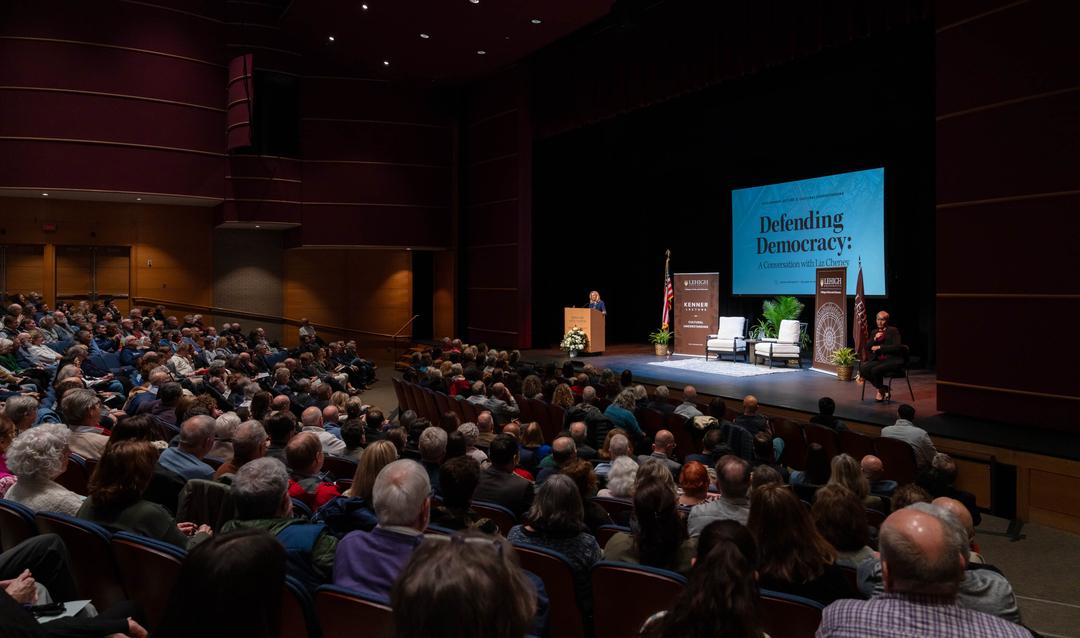Speaking before a capacity crowd at Lehigh University Tuesday night, former U.S. Rep. Liz Cheney said the threat that former President Donald Trump poses to the Constitution is “very real” and that those who believe in the Constitution have an obligation to make sure he loses his bid for the presidency in the November general election.
“When you're thinking about what is going to be required of all of us over the next eight months, I ask you to remember both the power and the obligation we have as individuals,” Cheney said. And, no question, “the vast majority of citizens of this great country want our kids to grow up and to live in a nation that is characterized by the peaceful transfer of power.”
If everyone works and votes together, she said, “we will be able to say that when this time of testing came, we stood up, and we did our duty because we love this country more.”
Cheney—who at great political cost became an outspoken critic of Trump following the Jan. 6, 2021 attack at the U.S. Capitol—came to Lehigh to deliver the Kenner Lecture on Cultural Understanding. The lecture, titled “Defending Democracy: A Conversation with Liz Cheney,” was hosted by the College of Arts and Sciences and held in Baker Hall in Zoellner Arts Center.
Cheney received a standing ovation after speaking directly to the audience for about 40 minutes. She received another standing ovation following a question-and-answer segment with Mary Anne Madeira, assistant professor of international relations.
Though Trump is likely to be the eventual Republican nominee, Cheney said he faces “some real warning signs” in a matchup against President Joe Biden, the likely Democratic nominee, as 30% to 40% of Republicans say they won’t vote for Trump.
“That is not a winning recipe for him going into a general,” Cheney said. For those who believe in the Constitution, she said, what’s key is “to make sure people understand that no matter how frustrated you might be with Joe Biden's policies—and I certainly disagree with many of them, and I'm not endorsing anybody tonight— ... we can survive bad policies. We can't survive a president who goes to war with the Constitution.”
A Political Legacy
Cheney was introduced to the audience by Robert Flowers, the Herbert J. and Ann L. Siegel Dean of the College of Arts and Sciences.
“She has been a steadfast advocate for the principles that underpin our system of governance, and has consistently demonstrated commitment to truth, accountability and preservation of democratic norms,” he said.
Cheney opened her lecture with stories from her childhood, including one in which then-President Gerald Ford had stayed at her home in Wyoming after campaigning for her father, Dick Cheney, who was running for Congress at the time. A gaggle of school friends had lined up outside, encouraged by her sister, to try to get the president’s autograph.
She talked too about the 2000 presidential election, when her father was the vice presidential candidate, and expressed admiration for Democrat Al Gore, who had conceded with grace in a very close race against Republican George W. Bush. At the time, Gore quoted Stephen Douglas’s remarks to Abraham Lincoln in saying, “Partisan feeling must yield to patriotism.”
She recalled how Gore had told the American public at the time that the election had been “resolved” after a Supreme Court ruling—“as it must be resolved through the honored institutions of our democracy. Our disappointment must be overcome by our love of country.”
When Bush and her father were sworn into office a few weeks later, the significance of the moment was not lost on her. She remembered thinking how amazing it was that “as Americans that we've been through that, and yet we were all participating in the peaceful transfer of power. And it's such an amazing and fundamental underpinning for our democracy, because of how powerful the office of the presidency is.”
Beginning with George Washington, she said, every president has upheld their fundamental oath of office to ensure that peaceful transfer of power—until Donald Trump.
Despite having lost the 2020 election to Biden, she said, Trump decided that he would not concede and would instead oversee a multipart plan focused on “corruptly” pressuring state legislatures to change their votes from Biden to Trump, pressuring the Department of Justice to help spread his stolen election lies, pressuring Vice President Mike Pence to take “illegal and unconstitutional action” to overturn the election, and summoning an angry mob to Washington, D.C., and sending them to march on the U.S. Capitol.
She said witnesses told the select committee that he didn’t stop watching televised news of the attack or call off the mob, even when he learned that a civilian had been shot at the entrance to the chamber of the U.S. House of Representatives.
“I don't care if you're a Republican or a Democrat or an Independent, that's depravity,” Cheney said. “And we cannot become numb to what that means for this country.”







